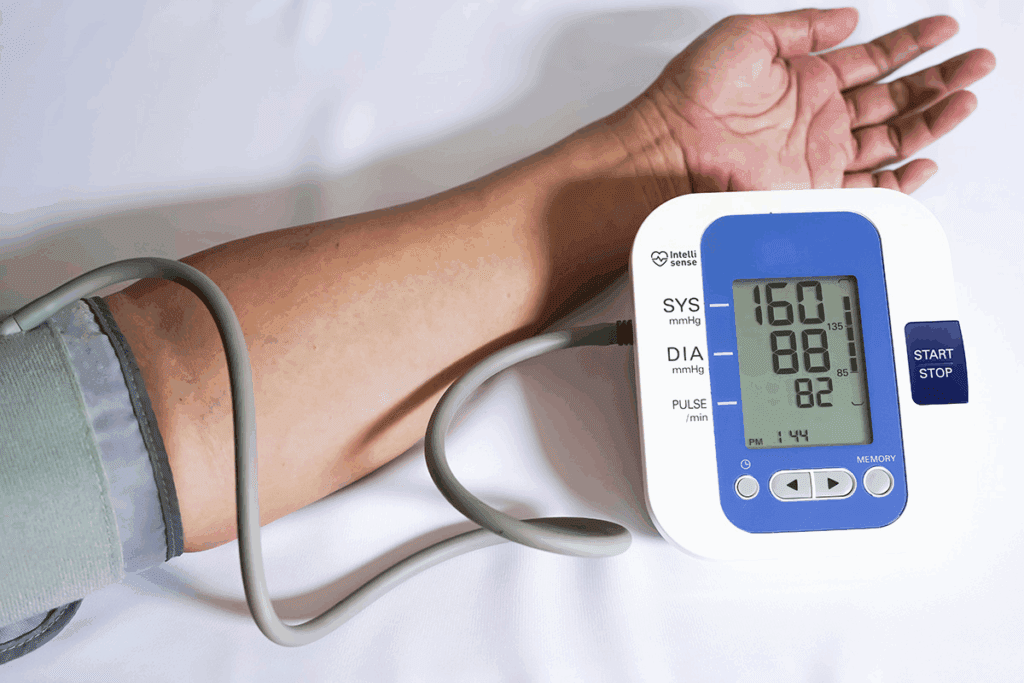
Chronic hypertension affects over 1 billion people worldwide. It’s not just a temporary increase in blood pressure. It’s a long-term threat that needs constant care.
Understand chronic hypertension, its causes, and how it leads to long-term issues.
Chronic hypertension means blood pressure stays high over time. This is different from occasional spikes.
Hypertension is diagnosed when blood pressure is high on two different days. Systolic readings must be ≥140 mmHg, and diastolic readings must be ≥90 mmHg. This makes it a chronic disease.
It needs ongoing management to avoid serious health problems. These include heart disease and stroke.
Understanding and managing high blood pressure is key to staying healthy. At Liv Hospital, we focus on the patient. We use the latest clinical protocols to help manage the condition.

Blood pressure is key to our health. Knowing the basics helps us manage high blood pressure. It shows how hard blood pushes against artery walls as the heart pumps.
We use a sphygmomanometer to measure blood pressure. It can be manual or digital. The reading shows two numbers: systolic and diastolic.
The systolic pressure is when the heart beats. The diastolic pressure is between beats. Accurate readings are vital for managing hypertension, say doctors.
Knowing blood pressure ranges is important. Normal blood pressure is below 120/80 mmHg. Elevated blood pressure is 120-129/80 mmHg.
Hypertension stage 1 is 130-139/80-89 mmHg. Stage 2 is 140 or higher/90 or higher mmHg. Recognizing these ranges helps in early detection and management.
Blood pressure involves the heart, blood vessels, and nervous system. The heart pumps blood, creating pressure. Blood vessels can change size, affecting pressure.
The nervous system controls heart rate and blood vessel size. This is key to managing blood pressure.

Chronic hypertension is a serious health issue that affects millions. It’s important to understand its definition, diagnosis, and how it’s different from acute hypertension. If not managed, it can lead to heart problems.
Doctors diagnose chronic hypertension when blood pressure stays high for a long time. They use several readings to confirm this. This method helps avoid false positives from temporary high blood pressure.
| Blood Pressure Category | Systolic mm Hg | Diastolic mm Hg |
| Normal | Less than 120 | Less than 80 |
| Elevated | 120-129 | Less than 80 |
| Hypertension Stage 1 | 130-139 | 80-89 |
| Hypertension Stage 2 | 140 or higher | 90 or higher |
Acute hypertension is a sudden and severe increase in blood pressure. It needs quick medical help. Chronic hypertension, on the other hand, develops slowly and lasts over time. While acute hypertension is urgent, chronic hypertension needs long-term care to avoid serious issues.
For hypertension to be called chronic, it must last for months or more. This long-term presence helps tell it apart from short-term high blood pressure. Chronic hypertension requires ongoing treatment and lifestyle changes.
High blood pressure is often called the ‘silent killer’ because it can sneak up on you. It usually doesn’t show symptoms until it’s too late. This makes it very dangerous, as people might not know they have it until they face a serious health issue.
Hypertension is called the ‘silent killer’ because it can harm your health without you noticing. Most people don’t feel any symptoms, which means they might not get help until it’s too late.
High blood pressure can sometimes cause symptoms like headaches, blurred vision, and chest pain. But these symptoms can also mean other things, making it hard to know if you have high blood pressure just by how you feel.
Even though high blood pressure usually doesn’t show symptoms, sometimes it can. This is more likely if your blood pressure is very high. Some symptoms include:
If you have these symptoms, it’s a sign of a hypertensive crisis. You need to see a doctor right away.
High blood pressure can quietly damage important organs like the heart, kidneys, and blood vessels. If it stays high for a long time, it can cause:
| Organ/System | Potential Damage |
| Heart | Left ventricular hypertrophy, heart failure |
| Kidneys | Kidney damage or failure |
| Blood Vessels | Atherosclerosis, aneurysms |
| Eyes | Retinopathy, vision loss |
A leading medical expert says, “The silent progression of hypertension is a major public health concern. It can lead to severe cardiovascular events without warning.”
“Hypertension is a major risk factor for cardiovascular disease, and its asymptomatic nature makes it a significant challenge for prevention and management.”
It’s important to understand how silent high blood pressure can be. Regular blood pressure checks and knowing your risk factors can help catch it early. This way, you can avoid serious health problems.
It’s important to know the different types of chronic hypertension. This knowledge helps in managing and treating the condition effectively. Chronic hypertension can take many forms, each needing a specific care plan.
Primary hypertension, or essential hypertension, makes up about 90-95% of cases. It develops slowly without a clear cause. Genetics, diet, exercise, and stress are thought to play a role in its development.
Secondary hypertension is caused by another medical issue. This can be kidney disease, adrenal gland problems, or some medications. Finding and treating the root cause is key to managing secondary hypertension.
Some common causes of secondary hypertension include:
Resistant hypertension doesn’t lower with standard treatments. It’s defined as blood pressure that stays high despite three different types of medications, including a diuretic.
Malignant hypertension is a severe and rare condition. It has very high blood pressure and can damage organs. It’s a medical emergency that needs quick treatment to avoid serious problems.
Knowing the type of hypertension helps doctors create better treatment plans. Understanding the specific type of hypertension is key to managing blood pressure effectively.
| Type of Hypertension | Characteristics | Management Approach |
| Primary (Essential) Hypertension | Develops gradually, no identifiable cause | Lifestyle modifications, medication |
| Secondary Hypertension | Caused by underlying medical condition | Treat underlying cause, lifestyle changes |
| Resistant Hypertension | Does not respond to standard treatment | Adjust medication regimen, consider alternative treatments |
| Malignant Hypertension | Severe, high blood pressure, organ damage | Immediate medical attention, aggressive treatment |
High blood pressure is seen as a chronic disease because of its lasting effects on health. We’ll look at what makes chronic diseases, how untreated hypertension gets worse, and why it needs long-term care. We’ll also compare it to other chronic conditions.
Chronic diseases last a long time, get worse slowly, and need constant care. Hypertension fits this bill because it’s a long-term condition that can cause serious health problems if not treated.
Key characteristics of chronic diseases include:
Untreated hypertension can harm vital organs like the heart, kidneys, and brain. This can lead to serious issues like heart failure, kidney disease, and stroke.
The worsening nature of hypertension shows why early treatment is key. Without control, high blood pressure can cause:
Managing hypertension needs a long-term effort in lifestyle changes and sometimes medication. This is vital to stop the disease from getting worse and its complications.
Effective long-term management of hypertension includes:
Hypertension, like diabetes and asthma, is a chronic condition needing ongoing care. While the exact management strategies may vary, the goal is the same: to control the condition to prevent complications.
Comparing hypertension to other chronic diseases shows the need for a complete management plan. This includes lifestyle changes and medical treatment. It also highlights the importance of educating and supporting patients in managing their conditions.
In conclusion, hypertension is a chronic disease because it’s persistent, needs long-term care, and can cause serious health problems if untreated. Understanding these points helps us better manage hypertension and improve the lives of those affected.
Prolonged hypertension can cause serious health problems. It can harm many organs in the body. High blood pressure can damage the heart, brain, kidneys, and more if not treated.
High blood pressure is a big risk for heart disease. It can lead to:
Hypertension also risks the brain. It can cause:
The kidneys are also at risk from high blood pressure. It can cause:
Pregnant women with hypertension face serious risks. These include:
Managing hypertension is key to avoiding damage to vital organs.
Chronic high blood pressure, or hypertension, comes from many sources. These can be genetic, lifestyle-related, or due to other health issues. Knowing these factors is key to preventing and managing hypertension.
Genetics play a big role in chronic hypertension. If your family has a history of high blood pressure, you’re more likely to get it. We’ll look at how genes can lead to hypertension and why knowing your family’s health history matters.
Our lifestyle choices greatly affect our risk of chronic high blood pressure. Diet, exercise, stress, smoking, and alcohol use can all raise blood pressure. We’ll see how changing these habits can help manage and prevent high blood pressure.
| Lifestyle Factor | Impact on Hypertension | Recommended Change |
| Diet | High sodium and low potassium intake can increase blood pressure. | Adopt a balanced diet rich in fruits, vegetables, and whole grains. |
| Physical Activity | Sedentary lifestyle contributes to higher blood pressure. | Engage in regular aerobic exercise, such as walking or cycling. |
| Stress | Chronic stress can elevate blood pressure levels. | Practice stress-reducing techniques like meditation or yoga. |
Age, gender, and ethnicity also affect hypertension risk. We’ll explore how these factors impact risk and what they mean for different groups.
Some medical conditions raise the risk of chronic high blood pressure. Diabetes, kidney disease, and sleep apnea are examples. Understanding these risks helps in early detection and management of high blood pressure.
By knowing the risk factors for chronic high blood pressure, we can take steps to prevent and manage it. This includes making healthier lifestyle choices, managing health conditions, and being aware of genetic risks.
Managing chronic hypertension is tough due to many reasons. These include sticking to medication and making lifestyle changes. Yet, only about 25% of U.S. adults with high blood pressure have it under control.
Several factors contribute to the low control rate. Medication non-adherence is a big problem. Many patients don’t take their meds as they should. Also, lifestyle factors like diet, exercise, and stress levels are key in managing blood pressure.
There are many medications for managing hypertension, like diuretics, ACE inhibitors, and beta-blockers. But, sticking to medication is a big challenge. Patients might face side effects or forget to take their meds.
Lifestyle changes are key in managing hypertension. Dietary changes like eating less sodium and more fruits and veggies help a lot. Also, regular physical activity is very important.
It’s important to regularly check blood pressure. But, access to healthcare is a problem for many. Making sure patients can get regular check-ups helps a lot.
By tackling these challenges and using effective management strategies, we can better control hypertension. This will help lower the risk of serious complications.
Managing chronic hypertension is key to avoiding serious health problems. We’ve looked into the details of high blood pressure. This includes its causes, risks, and why it’s so important to keep it under control.
Dealing with hypertension needs a mix of lifestyle changes, sticking to medication, and regular check-ups. These steps can greatly improve your life and lower the risks of high blood pressure.
Controlling chronic hypertension is a long-term effort. It means working closely with doctors to create a treatment plan that fits you. We stress how vital it is to control blood pressure to avoid heart disease, kidney damage, and other health issues.
By knowing about the condition and taking action, people can manage their hypertension well. High blood pressure can be controlled with the right approach.
Chronic hypertension, also known as chronic high blood pressure, is a condition where blood pressure stays high for a long time. It’s usually above 140/90 mm Hg.
Yes, high blood pressure is a chronic disease. It needs long-term care and can cause serious health problems if not managed well.
There are several types of chronic hypertension. These include primary (essential) hypertension, secondary hypertension, resistant hypertension, and malignant hypertension. Each type has its own causes and characteristics.
Hypertension is called “the silent killer” because it often goes unnoticed. It can progress without symptoms, making it hard to detect. If not treated, it can cause serious health issues, like heart disease and kidney damage.
Several factors can increase the risk of chronic hypertension. These include genetic predispositions, lifestyle choices like diet and exercise, age, ethnicity, and certain medical conditions.
Blood pressure is measured with a sphygmomanometer. Normal blood pressure is below 120/80 mm Hg. Elevated blood pressure is between 120-129/80 mm Hg. Hypertension is 140/90 mm Hg or higher.
Prolonged hypertension can lead to serious health issues. These include heart attack and heart failure, stroke, kidney damage and failure, and complications during pregnancy like preeclampsia.
Managing chronic hypertension involves lifestyle changes and medication. It’s important to monitor blood pressure regularly and have access to healthcare for effective management.
While some risk factors for chronic hypertension can’t be changed, like genetics, others can be managed. Lifestyle changes, early detection, and management can help prevent or delay hypertension.
Yes, hypertension is a chronic condition that needs ongoing management. This includes regular blood pressure checks, following treatment plans, and making lifestyle changes to control blood pressure and prevent complications.
World Health Organization. (2025). What Is Chronic Hypertension and Why Is High. Retrieved from https://www.who.int/news-room/fact-sheets/detail/hypertension
Subscribe to our e-newsletter to stay informed about the latest innovations in the world of health and exclusive offers!
WhatsApp us